Tourism's Impact on Socioeconomic Development in Rio de Janeiro
VerifiedAdded on 2022/11/30
|13
|3310
|424
Report
AI Summary
This report investigates the contribution of tourism to socioeconomic growth and development in Rio de Janeiro, Brazil. It begins with an introduction to tourism and its benefits, including revenue generation, infrastructure development, and job creation. A literature review explores existing research on socioeconomic growth, identifying gaps in understanding the specific impact of tourism. The research aims to evaluate how tourism promotes socioeconomic growth and development in Rio de Janeiro. The methodology section details the research approach, including the use of positivism and a deductive approach, along with a survey strategy using questionnaires to collect quantitative data from a sample of 20 people. The report discusses the ways to promote socioeconomic growth and development, the main contributions of tourism (employment generation and infrastructure development), and the benefits of socioeconomic growth for economic development. The findings highlight tourism's role in generating employment opportunities, developing infrastructure, and improving the standard of living for the residents of Rio de Janeiro. The report concludes with recommendations and references for further study.
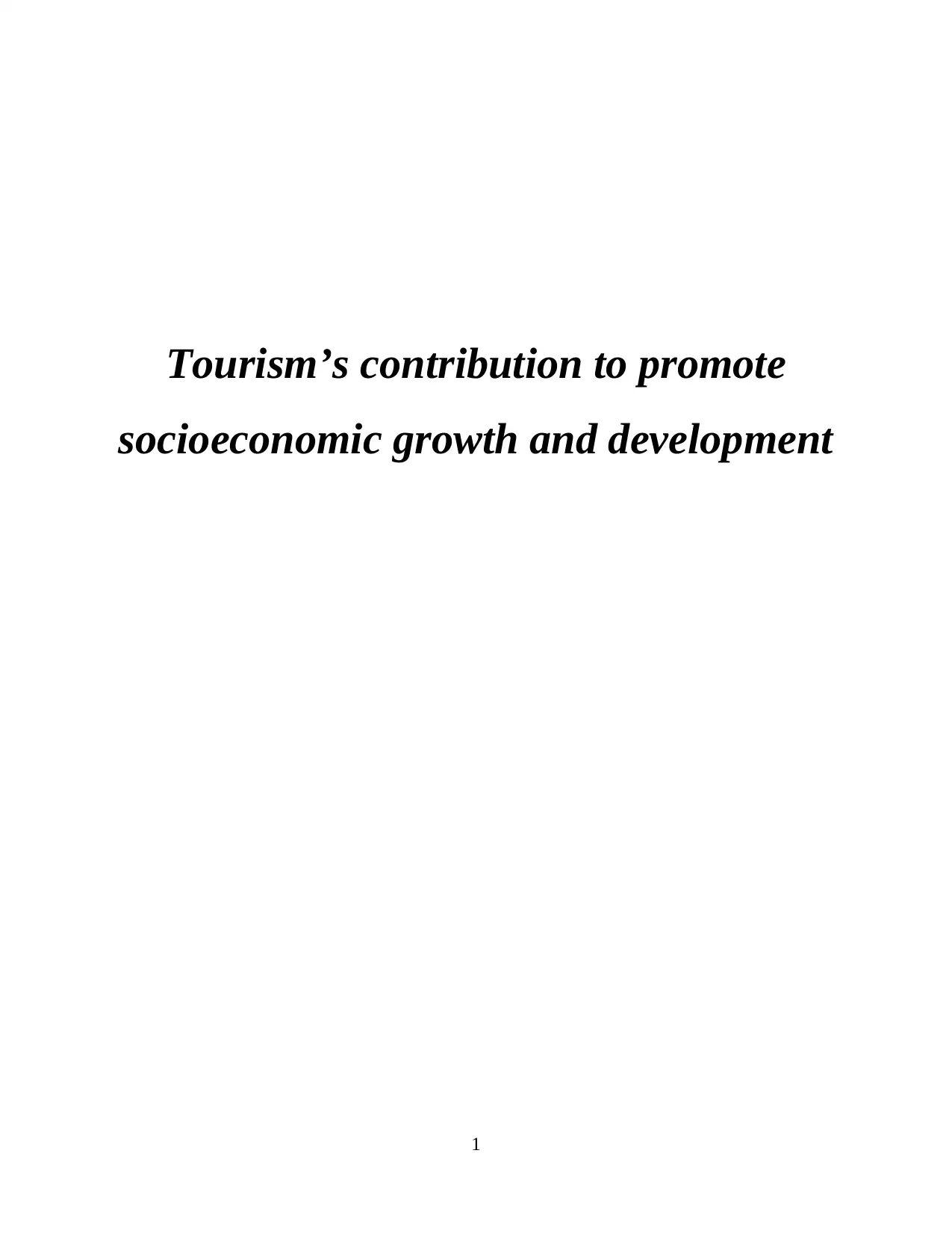
Tourism’s contribution to promote
socioeconomic growth and development
1
socioeconomic growth and development
1
Paraphrase This Document
Need a fresh take? Get an instant paraphrase of this document with our AI Paraphraser
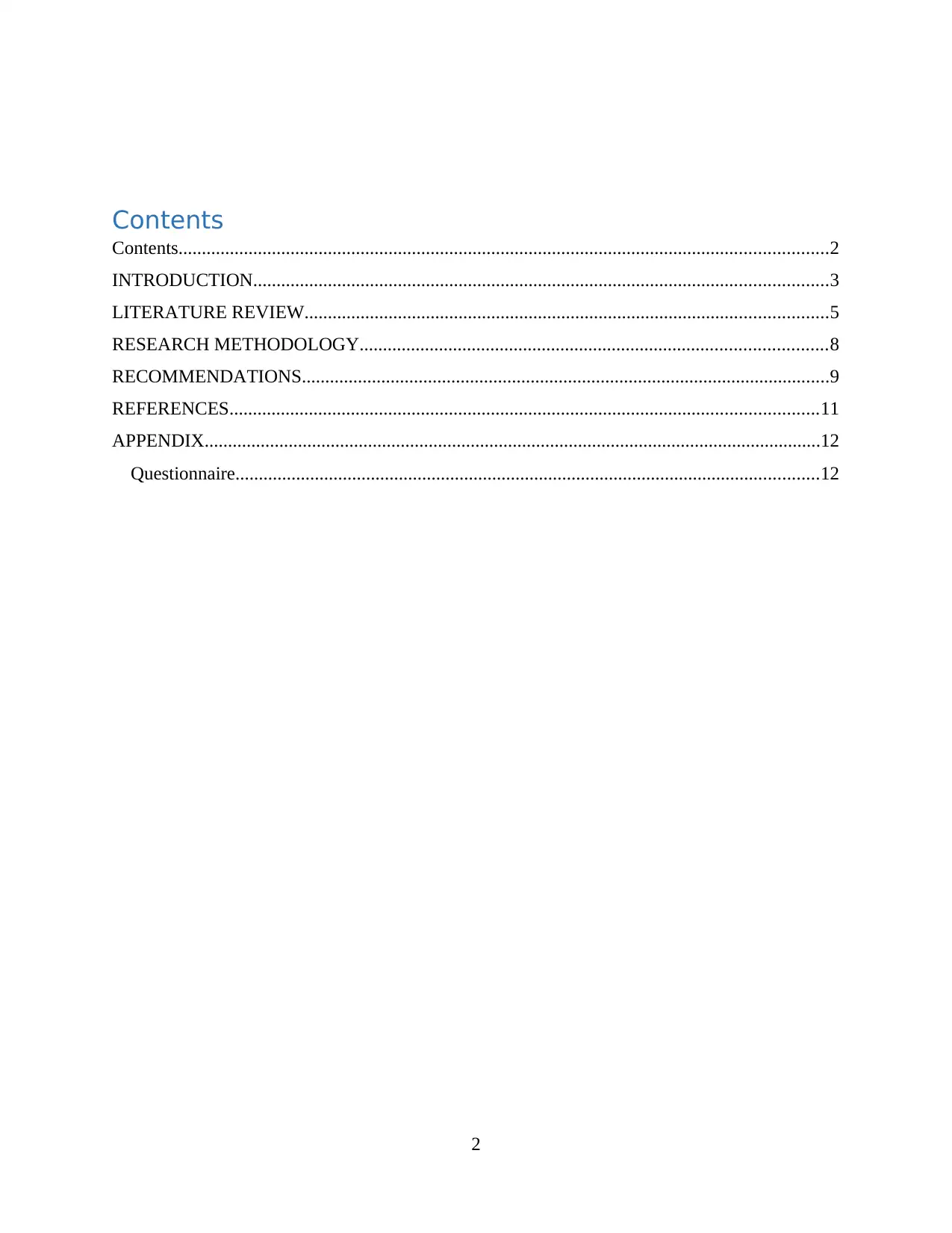
Contents
Contents...........................................................................................................................................2
INTRODUCTION...........................................................................................................................3
LITERATURE REVIEW................................................................................................................5
RESEARCH METHODOLOGY....................................................................................................8
RECOMMENDATIONS.................................................................................................................9
REFERENCES..............................................................................................................................11
APPENDIX....................................................................................................................................12
Questionnaire.............................................................................................................................12
2
Contents...........................................................................................................................................2
INTRODUCTION...........................................................................................................................3
LITERATURE REVIEW................................................................................................................5
RESEARCH METHODOLOGY....................................................................................................8
RECOMMENDATIONS.................................................................................................................9
REFERENCES..............................................................................................................................11
APPENDIX....................................................................................................................................12
Questionnaire.............................................................................................................................12
2
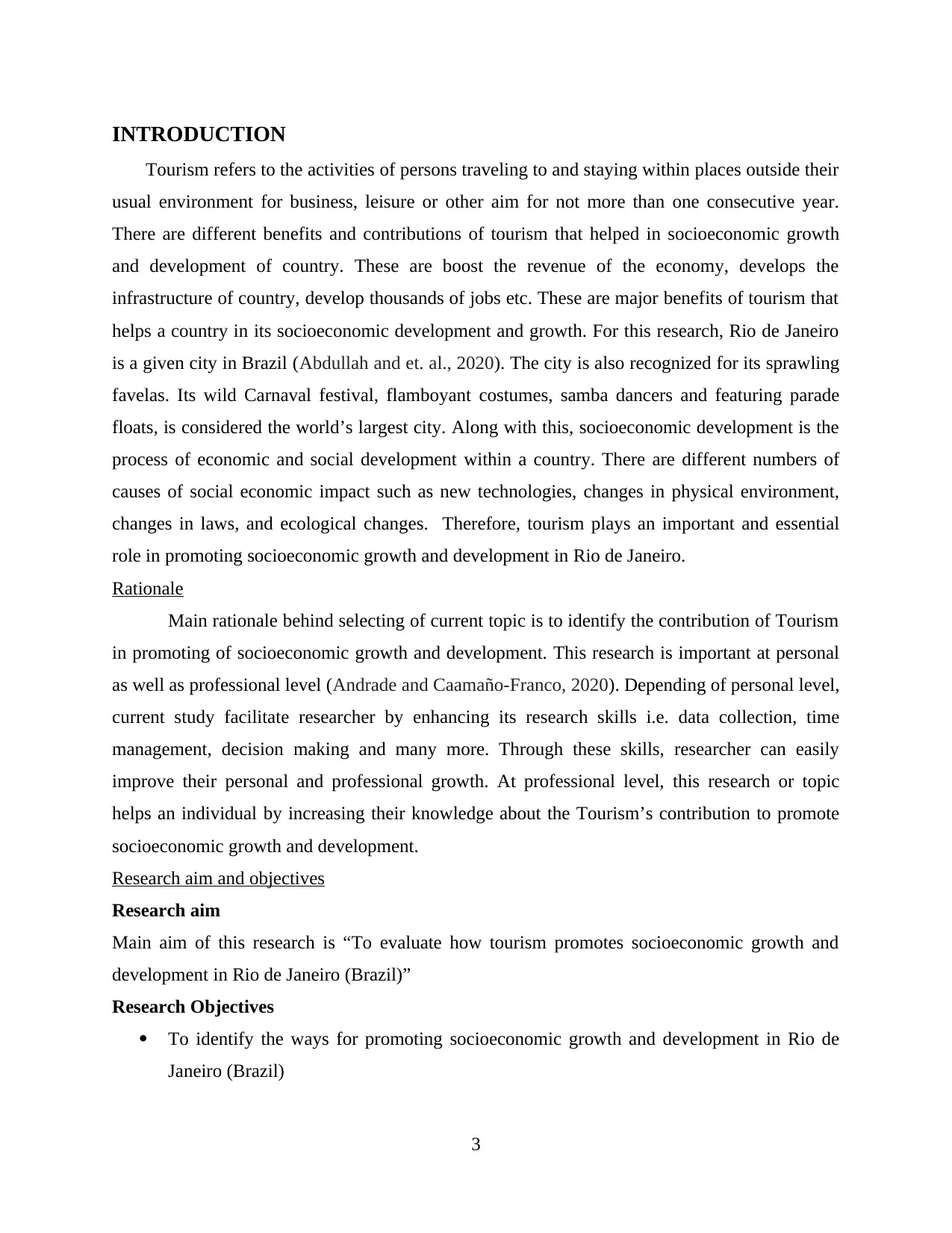
INTRODUCTION
Tourism refers to the activities of persons traveling to and staying within places outside their
usual environment for business, leisure or other aim for not more than one consecutive year.
There are different benefits and contributions of tourism that helped in socioeconomic growth
and development of country. These are boost the revenue of the economy, develops the
infrastructure of country, develop thousands of jobs etc. These are major benefits of tourism that
helps a country in its socioeconomic development and growth. For this research, Rio de Janeiro
is a given city in Brazil (Abdullah and et. al., 2020). The city is also recognized for its sprawling
favelas. Its wild Carnaval festival, flamboyant costumes, samba dancers and featuring parade
floats, is considered the world’s largest city. Along with this, socioeconomic development is the
process of economic and social development within a country. There are different numbers of
causes of social economic impact such as new technologies, changes in physical environment,
changes in laws, and ecological changes. Therefore, tourism plays an important and essential
role in promoting socioeconomic growth and development in Rio de Janeiro.
Rationale
Main rationale behind selecting of current topic is to identify the contribution of Tourism
in promoting of socioeconomic growth and development. This research is important at personal
as well as professional level (Andrade and Caamaño-Franco, 2020). Depending of personal level,
current study facilitate researcher by enhancing its research skills i.e. data collection, time
management, decision making and many more. Through these skills, researcher can easily
improve their personal and professional growth. At professional level, this research or topic
helps an individual by increasing their knowledge about the Tourism’s contribution to promote
socioeconomic growth and development.
Research aim and objectives
Research aim
Main aim of this research is “To evaluate how tourism promotes socioeconomic growth and
development in Rio de Janeiro (Brazil)”
Research Objectives
To identify the ways for promoting socioeconomic growth and development in Rio de
Janeiro (Brazil)
3
Tourism refers to the activities of persons traveling to and staying within places outside their
usual environment for business, leisure or other aim for not more than one consecutive year.
There are different benefits and contributions of tourism that helped in socioeconomic growth
and development of country. These are boost the revenue of the economy, develops the
infrastructure of country, develop thousands of jobs etc. These are major benefits of tourism that
helps a country in its socioeconomic development and growth. For this research, Rio de Janeiro
is a given city in Brazil (Abdullah and et. al., 2020). The city is also recognized for its sprawling
favelas. Its wild Carnaval festival, flamboyant costumes, samba dancers and featuring parade
floats, is considered the world’s largest city. Along with this, socioeconomic development is the
process of economic and social development within a country. There are different numbers of
causes of social economic impact such as new technologies, changes in physical environment,
changes in laws, and ecological changes. Therefore, tourism plays an important and essential
role in promoting socioeconomic growth and development in Rio de Janeiro.
Rationale
Main rationale behind selecting of current topic is to identify the contribution of Tourism
in promoting of socioeconomic growth and development. This research is important at personal
as well as professional level (Andrade and Caamaño-Franco, 2020). Depending of personal level,
current study facilitate researcher by enhancing its research skills i.e. data collection, time
management, decision making and many more. Through these skills, researcher can easily
improve their personal and professional growth. At professional level, this research or topic
helps an individual by increasing their knowledge about the Tourism’s contribution to promote
socioeconomic growth and development.
Research aim and objectives
Research aim
Main aim of this research is “To evaluate how tourism promotes socioeconomic growth and
development in Rio de Janeiro (Brazil)”
Research Objectives
To identify the ways for promoting socioeconomic growth and development in Rio de
Janeiro (Brazil)
3
⊘ This is a preview!⊘
Do you want full access?
Subscribe today to unlock all pages.

Trusted by 1+ million students worldwide
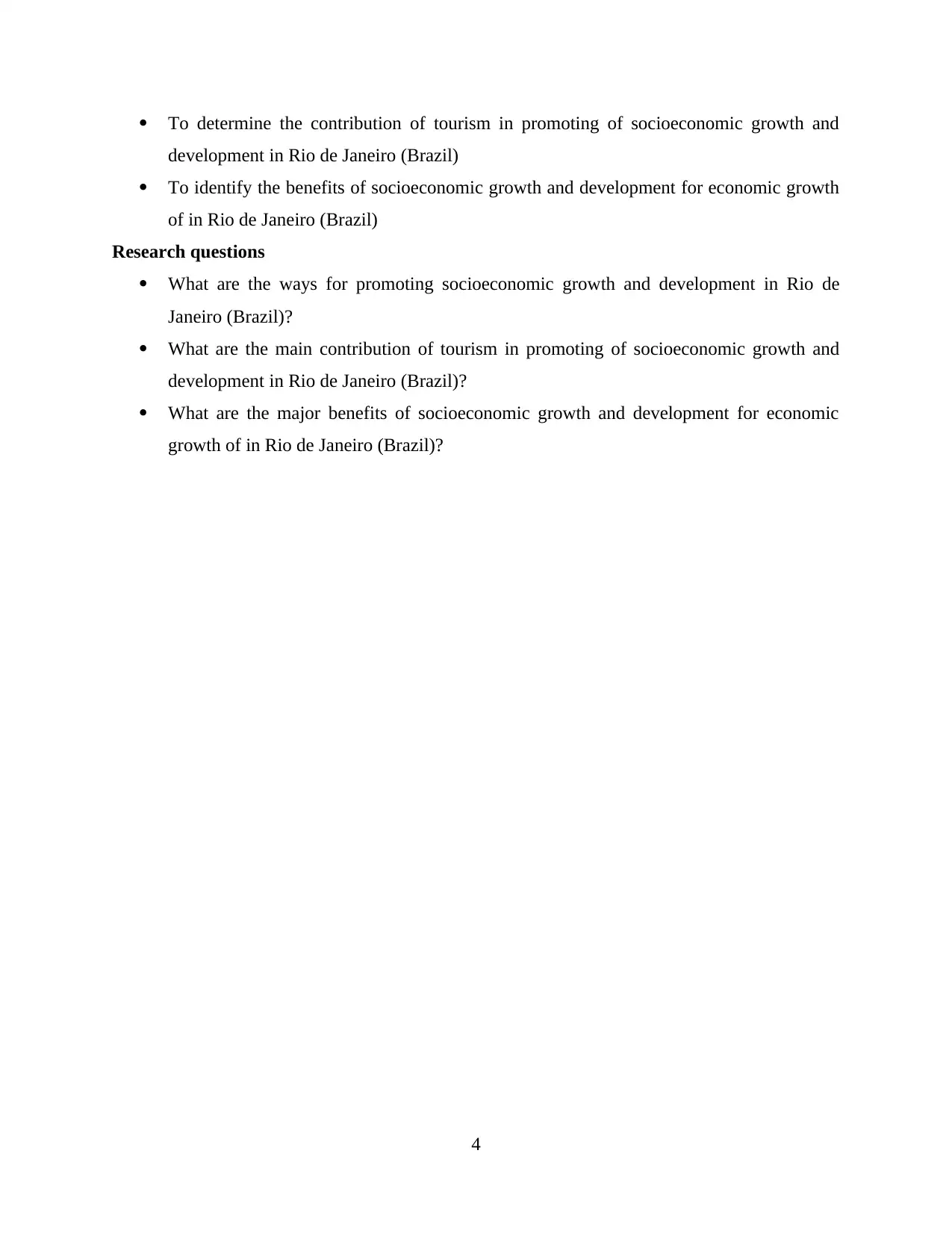
To determine the contribution of tourism in promoting of socioeconomic growth and
development in Rio de Janeiro (Brazil)
To identify the benefits of socioeconomic growth and development for economic growth
of in Rio de Janeiro (Brazil)
Research questions
What are the ways for promoting socioeconomic growth and development in Rio de
Janeiro (Brazil)?
What are the main contribution of tourism in promoting of socioeconomic growth and
development in Rio de Janeiro (Brazil)?
What are the major benefits of socioeconomic growth and development for economic
growth of in Rio de Janeiro (Brazil)?
4
development in Rio de Janeiro (Brazil)
To identify the benefits of socioeconomic growth and development for economic growth
of in Rio de Janeiro (Brazil)
Research questions
What are the ways for promoting socioeconomic growth and development in Rio de
Janeiro (Brazil)?
What are the main contribution of tourism in promoting of socioeconomic growth and
development in Rio de Janeiro (Brazil)?
What are the major benefits of socioeconomic growth and development for economic
growth of in Rio de Janeiro (Brazil)?
4
Paraphrase This Document
Need a fresh take? Get an instant paraphrase of this document with our AI Paraphraser
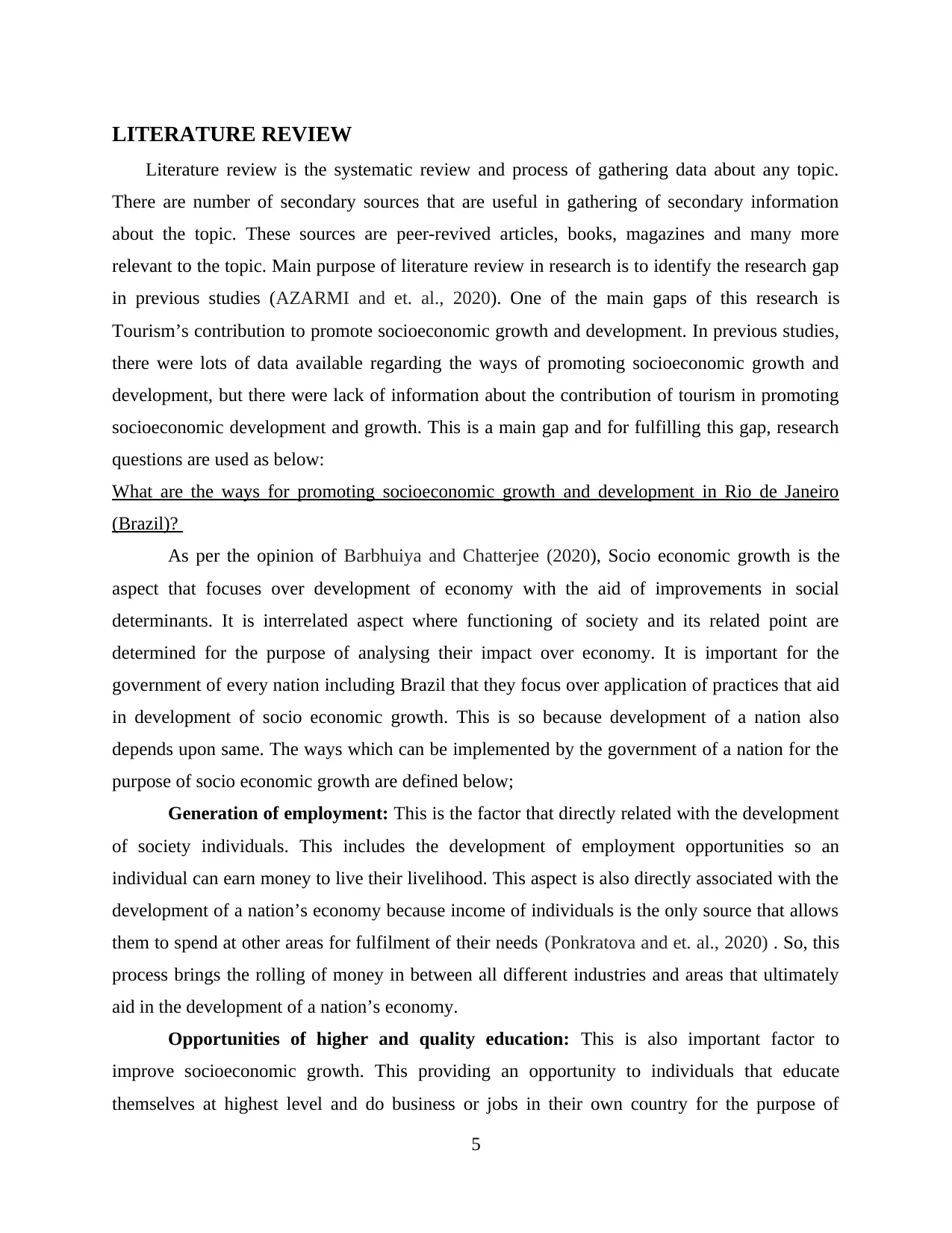
LITERATURE REVIEW
Literature review is the systematic review and process of gathering data about any topic.
There are number of secondary sources that are useful in gathering of secondary information
about the topic. These sources are peer-revived articles, books, magazines and many more
relevant to the topic. Main purpose of literature review in research is to identify the research gap
in previous studies (AZARMI and et. al., 2020). One of the main gaps of this research is
Tourism’s contribution to promote socioeconomic growth and development. In previous studies,
there were lots of data available regarding the ways of promoting socioeconomic growth and
development, but there were lack of information about the contribution of tourism in promoting
socioeconomic development and growth. This is a main gap and for fulfilling this gap, research
questions are used as below:
What are the ways for promoting socioeconomic growth and development in Rio de Janeiro
(Brazil)?
As per the opinion of Barbhuiya and Chatterjee (2020), Socio economic growth is the
aspect that focuses over development of economy with the aid of improvements in social
determinants. It is interrelated aspect where functioning of society and its related point are
determined for the purpose of analysing their impact over economy. It is important for the
government of every nation including Brazil that they focus over application of practices that aid
in development of socio economic growth. This is so because development of a nation also
depends upon same. The ways which can be implemented by the government of a nation for the
purpose of socio economic growth are defined below;
Generation of employment: This is the factor that directly related with the development
of society individuals. This includes the development of employment opportunities so an
individual can earn money to live their livelihood. This aspect is also directly associated with the
development of a nation’s economy because income of individuals is the only source that allows
them to spend at other areas for fulfilment of their needs (Ponkratova and et. al., 2020) . So, this
process brings the rolling of money in between all different industries and areas that ultimately
aid in the development of a nation’s economy.
Opportunities of higher and quality education: This is also important factor to
improve socioeconomic growth. This providing an opportunity to individuals that educate
themselves at highest level and do business or jobs in their own country for the purpose of
5
Literature review is the systematic review and process of gathering data about any topic.
There are number of secondary sources that are useful in gathering of secondary information
about the topic. These sources are peer-revived articles, books, magazines and many more
relevant to the topic. Main purpose of literature review in research is to identify the research gap
in previous studies (AZARMI and et. al., 2020). One of the main gaps of this research is
Tourism’s contribution to promote socioeconomic growth and development. In previous studies,
there were lots of data available regarding the ways of promoting socioeconomic growth and
development, but there were lack of information about the contribution of tourism in promoting
socioeconomic development and growth. This is a main gap and for fulfilling this gap, research
questions are used as below:
What are the ways for promoting socioeconomic growth and development in Rio de Janeiro
(Brazil)?
As per the opinion of Barbhuiya and Chatterjee (2020), Socio economic growth is the
aspect that focuses over development of economy with the aid of improvements in social
determinants. It is interrelated aspect where functioning of society and its related point are
determined for the purpose of analysing their impact over economy. It is important for the
government of every nation including Brazil that they focus over application of practices that aid
in development of socio economic growth. This is so because development of a nation also
depends upon same. The ways which can be implemented by the government of a nation for the
purpose of socio economic growth are defined below;
Generation of employment: This is the factor that directly related with the development
of society individuals. This includes the development of employment opportunities so an
individual can earn money to live their livelihood. This aspect is also directly associated with the
development of a nation’s economy because income of individuals is the only source that allows
them to spend at other areas for fulfilment of their needs (Ponkratova and et. al., 2020) . So, this
process brings the rolling of money in between all different industries and areas that ultimately
aid in the development of a nation’s economy.
Opportunities of higher and quality education: This is also important factor to
improve socioeconomic growth. This providing an opportunity to individuals that educate
themselves at highest level and do business or jobs in their own country for the purpose of
5
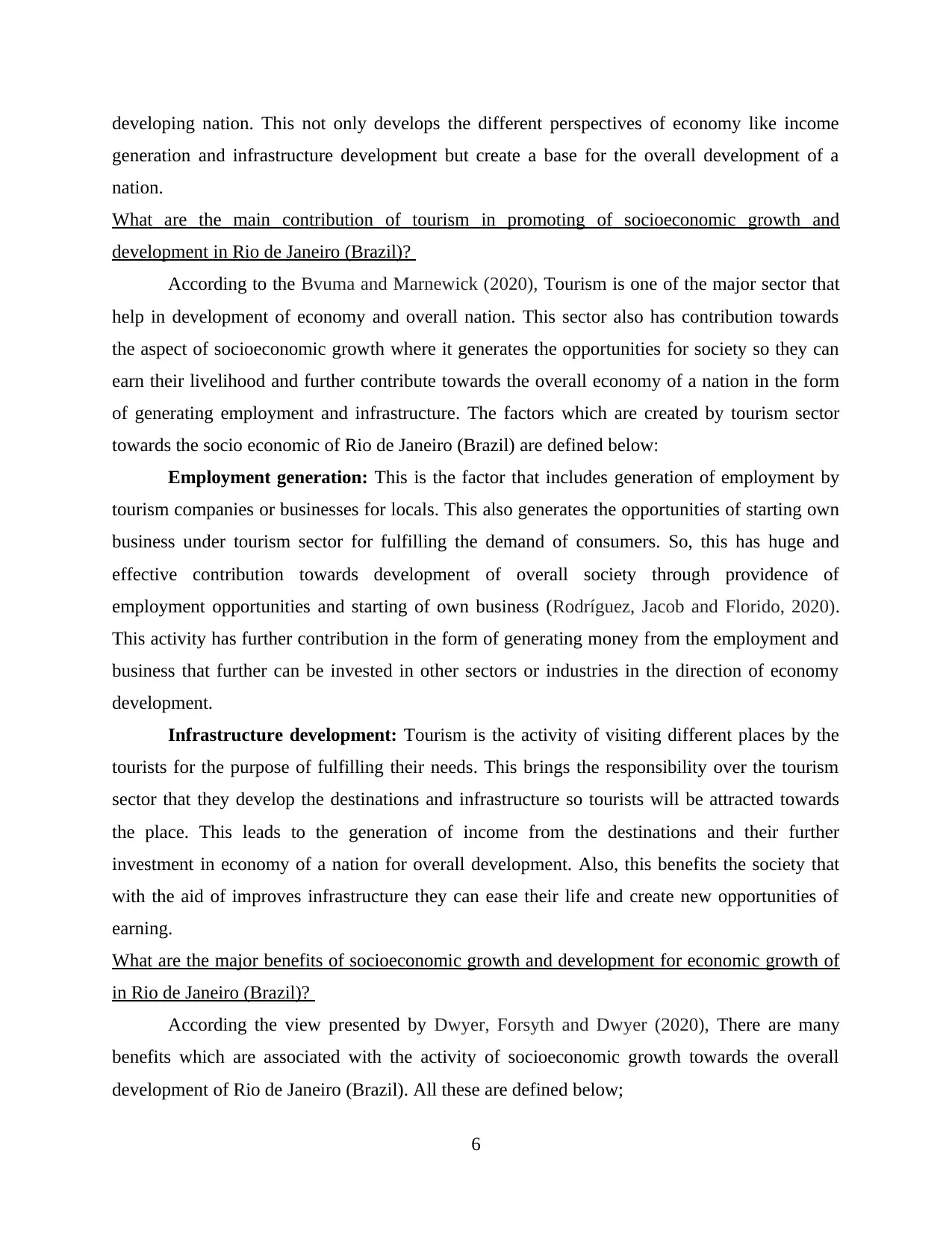
developing nation. This not only develops the different perspectives of economy like income
generation and infrastructure development but create a base for the overall development of a
nation.
What are the main contribution of tourism in promoting of socioeconomic growth and
development in Rio de Janeiro (Brazil)?
According to the Bvuma and Marnewick (2020), Tourism is one of the major sector that
help in development of economy and overall nation. This sector also has contribution towards
the aspect of socioeconomic growth where it generates the opportunities for society so they can
earn their livelihood and further contribute towards the overall economy of a nation in the form
of generating employment and infrastructure. The factors which are created by tourism sector
towards the socio economic of Rio de Janeiro (Brazil) are defined below:
Employment generation: This is the factor that includes generation of employment by
tourism companies or businesses for locals. This also generates the opportunities of starting own
business under tourism sector for fulfilling the demand of consumers. So, this has huge and
effective contribution towards development of overall society through providence of
employment opportunities and starting of own business (Rodríguez, Jacob and Florido, 2020).
This activity has further contribution in the form of generating money from the employment and
business that further can be invested in other sectors or industries in the direction of economy
development.
Infrastructure development: Tourism is the activity of visiting different places by the
tourists for the purpose of fulfilling their needs. This brings the responsibility over the tourism
sector that they develop the destinations and infrastructure so tourists will be attracted towards
the place. This leads to the generation of income from the destinations and their further
investment in economy of a nation for overall development. Also, this benefits the society that
with the aid of improves infrastructure they can ease their life and create new opportunities of
earning.
What are the major benefits of socioeconomic growth and development for economic growth of
in Rio de Janeiro (Brazil)?
According the view presented by Dwyer, Forsyth and Dwyer (2020), There are many
benefits which are associated with the activity of socioeconomic growth towards the overall
development of Rio de Janeiro (Brazil). All these are defined below;
6
generation and infrastructure development but create a base for the overall development of a
nation.
What are the main contribution of tourism in promoting of socioeconomic growth and
development in Rio de Janeiro (Brazil)?
According to the Bvuma and Marnewick (2020), Tourism is one of the major sector that
help in development of economy and overall nation. This sector also has contribution towards
the aspect of socioeconomic growth where it generates the opportunities for society so they can
earn their livelihood and further contribute towards the overall economy of a nation in the form
of generating employment and infrastructure. The factors which are created by tourism sector
towards the socio economic of Rio de Janeiro (Brazil) are defined below:
Employment generation: This is the factor that includes generation of employment by
tourism companies or businesses for locals. This also generates the opportunities of starting own
business under tourism sector for fulfilling the demand of consumers. So, this has huge and
effective contribution towards development of overall society through providence of
employment opportunities and starting of own business (Rodríguez, Jacob and Florido, 2020).
This activity has further contribution in the form of generating money from the employment and
business that further can be invested in other sectors or industries in the direction of economy
development.
Infrastructure development: Tourism is the activity of visiting different places by the
tourists for the purpose of fulfilling their needs. This brings the responsibility over the tourism
sector that they develop the destinations and infrastructure so tourists will be attracted towards
the place. This leads to the generation of income from the destinations and their further
investment in economy of a nation for overall development. Also, this benefits the society that
with the aid of improves infrastructure they can ease their life and create new opportunities of
earning.
What are the major benefits of socioeconomic growth and development for economic growth of
in Rio de Janeiro (Brazil)?
According the view presented by Dwyer, Forsyth and Dwyer (2020), There are many
benefits which are associated with the activity of socioeconomic growth towards the overall
development of Rio de Janeiro (Brazil). All these are defined below;
6
⊘ This is a preview!⊘
Do you want full access?
Subscribe today to unlock all pages.

Trusted by 1+ million students worldwide
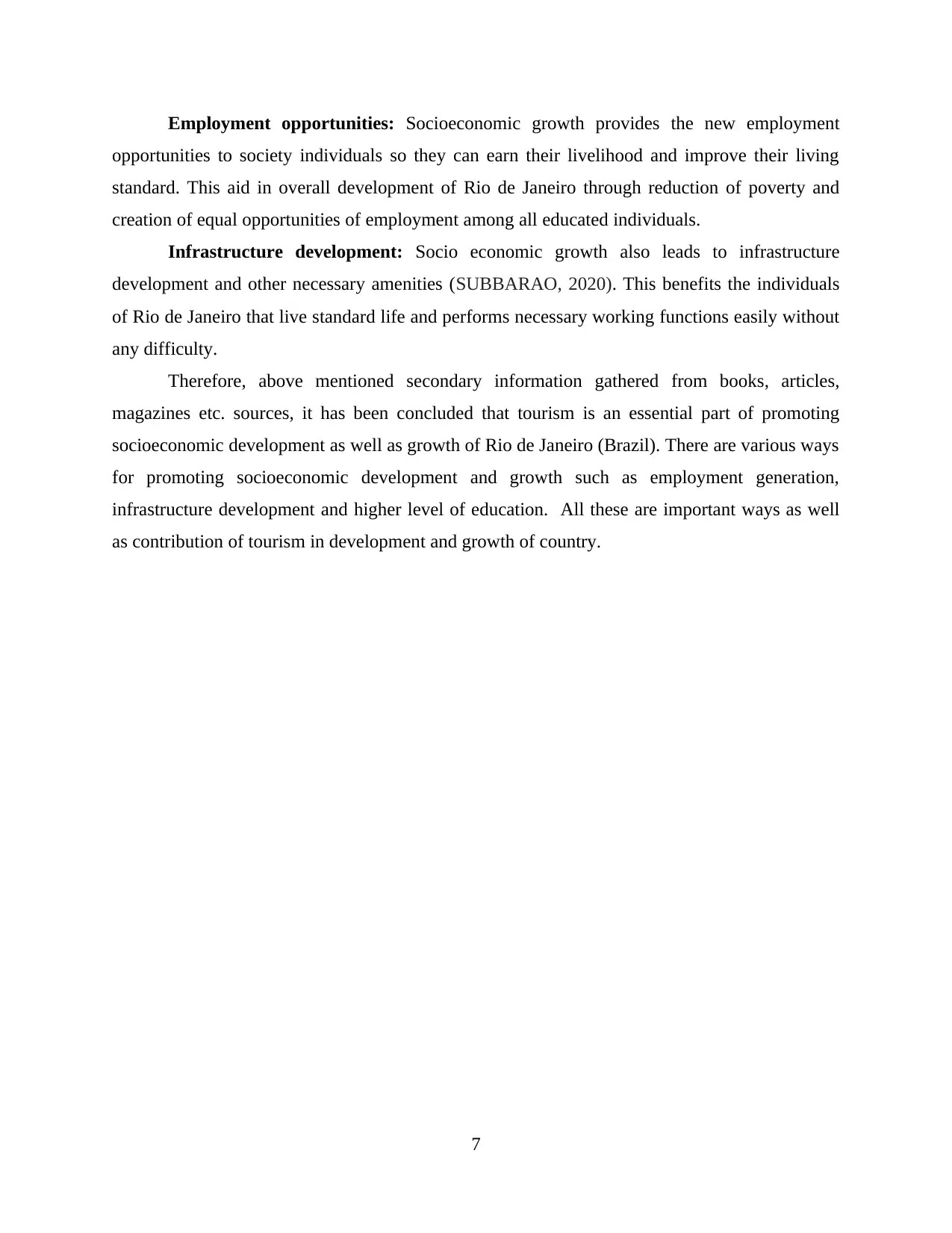
Employment opportunities: Socioeconomic growth provides the new employment
opportunities to society individuals so they can earn their livelihood and improve their living
standard. This aid in overall development of Rio de Janeiro through reduction of poverty and
creation of equal opportunities of employment among all educated individuals.
Infrastructure development: Socio economic growth also leads to infrastructure
development and other necessary amenities (SUBBARAO, 2020). This benefits the individuals
of Rio de Janeiro that live standard life and performs necessary working functions easily without
any difficulty.
Therefore, above mentioned secondary information gathered from books, articles,
magazines etc. sources, it has been concluded that tourism is an essential part of promoting
socioeconomic development as well as growth of Rio de Janeiro (Brazil). There are various ways
for promoting socioeconomic development and growth such as employment generation,
infrastructure development and higher level of education. All these are important ways as well
as contribution of tourism in development and growth of country.
7
opportunities to society individuals so they can earn their livelihood and improve their living
standard. This aid in overall development of Rio de Janeiro through reduction of poverty and
creation of equal opportunities of employment among all educated individuals.
Infrastructure development: Socio economic growth also leads to infrastructure
development and other necessary amenities (SUBBARAO, 2020). This benefits the individuals
of Rio de Janeiro that live standard life and performs necessary working functions easily without
any difficulty.
Therefore, above mentioned secondary information gathered from books, articles,
magazines etc. sources, it has been concluded that tourism is an essential part of promoting
socioeconomic development as well as growth of Rio de Janeiro (Brazil). There are various ways
for promoting socioeconomic development and growth such as employment generation,
infrastructure development and higher level of education. All these are important ways as well
as contribution of tourism in development and growth of country.
7
Paraphrase This Document
Need a fresh take? Get an instant paraphrase of this document with our AI Paraphraser
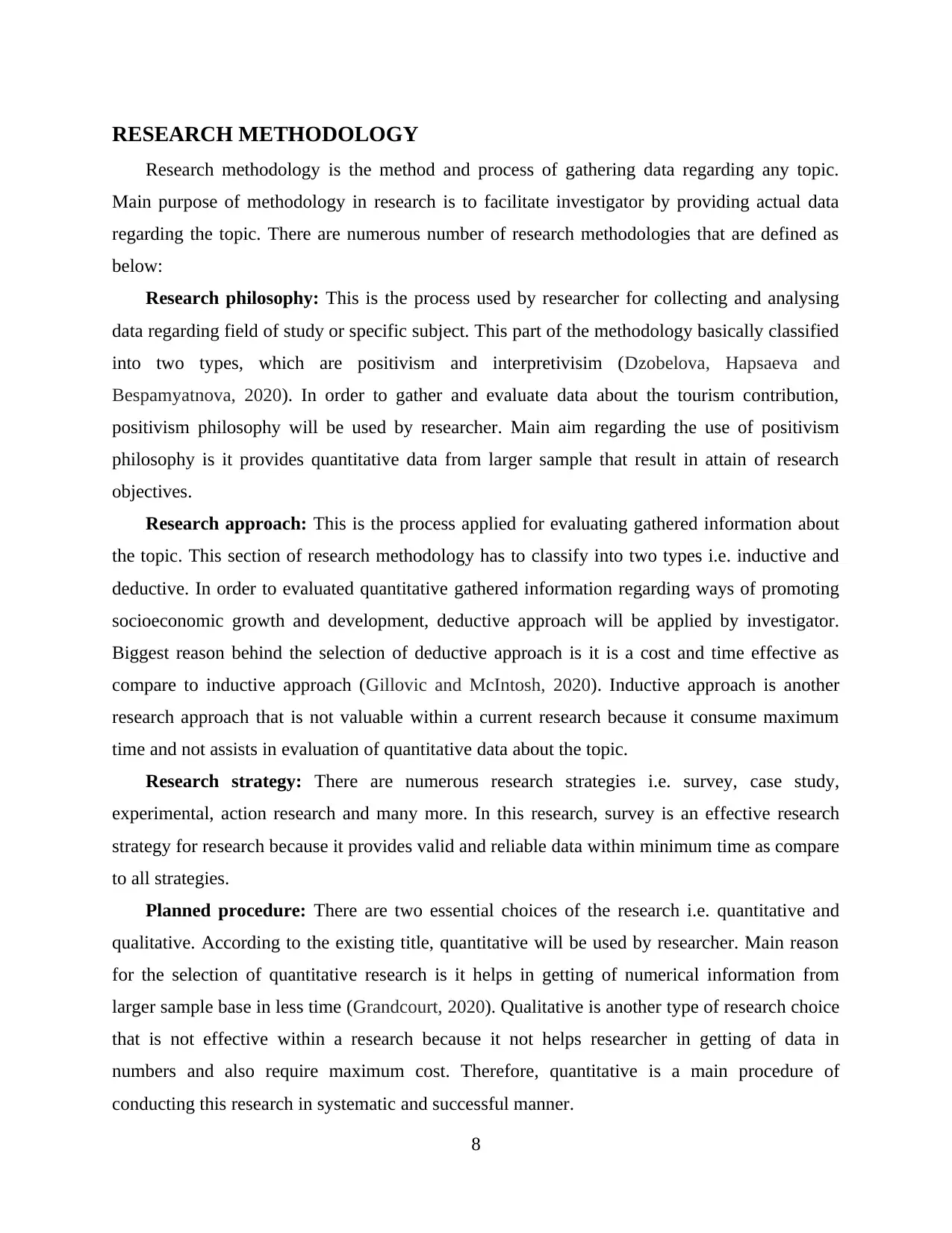
RESEARCH METHODOLOGY
Research methodology is the method and process of gathering data regarding any topic.
Main purpose of methodology in research is to facilitate investigator by providing actual data
regarding the topic. There are numerous number of research methodologies that are defined as
below:
Research philosophy: This is the process used by researcher for collecting and analysing
data regarding field of study or specific subject. This part of the methodology basically classified
into two types, which are positivism and interpretivisim (Dzobelova, Hapsaeva and
Bespamyatnova, 2020). In order to gather and evaluate data about the tourism contribution,
positivism philosophy will be used by researcher. Main aim regarding the use of positivism
philosophy is it provides quantitative data from larger sample that result in attain of research
objectives.
Research approach: This is the process applied for evaluating gathered information about
the topic. This section of research methodology has to classify into two types i.e. inductive and
deductive. In order to evaluated quantitative gathered information regarding ways of promoting
socioeconomic growth and development, deductive approach will be applied by investigator.
Biggest reason behind the selection of deductive approach is it is a cost and time effective as
compare to inductive approach (Gillovic and McIntosh, 2020). Inductive approach is another
research approach that is not valuable within a current research because it consume maximum
time and not assists in evaluation of quantitative data about the topic.
Research strategy: There are numerous research strategies i.e. survey, case study,
experimental, action research and many more. In this research, survey is an effective research
strategy for research because it provides valid and reliable data within minimum time as compare
to all strategies.
Planned procedure: There are two essential choices of the research i.e. quantitative and
qualitative. According to the existing title, quantitative will be used by researcher. Main reason
for the selection of quantitative research is it helps in getting of numerical information from
larger sample base in less time (Grandcourt, 2020). Qualitative is another type of research choice
that is not effective within a research because it not helps researcher in getting of data in
numbers and also require maximum cost. Therefore, quantitative is a main procedure of
conducting this research in systematic and successful manner.
8
Research methodology is the method and process of gathering data regarding any topic.
Main purpose of methodology in research is to facilitate investigator by providing actual data
regarding the topic. There are numerous number of research methodologies that are defined as
below:
Research philosophy: This is the process used by researcher for collecting and analysing
data regarding field of study or specific subject. This part of the methodology basically classified
into two types, which are positivism and interpretivisim (Dzobelova, Hapsaeva and
Bespamyatnova, 2020). In order to gather and evaluate data about the tourism contribution,
positivism philosophy will be used by researcher. Main aim regarding the use of positivism
philosophy is it provides quantitative data from larger sample that result in attain of research
objectives.
Research approach: This is the process applied for evaluating gathered information about
the topic. This section of research methodology has to classify into two types i.e. inductive and
deductive. In order to evaluated quantitative gathered information regarding ways of promoting
socioeconomic growth and development, deductive approach will be applied by investigator.
Biggest reason behind the selection of deductive approach is it is a cost and time effective as
compare to inductive approach (Gillovic and McIntosh, 2020). Inductive approach is another
research approach that is not valuable within a current research because it consume maximum
time and not assists in evaluation of quantitative data about the topic.
Research strategy: There are numerous research strategies i.e. survey, case study,
experimental, action research and many more. In this research, survey is an effective research
strategy for research because it provides valid and reliable data within minimum time as compare
to all strategies.
Planned procedure: There are two essential choices of the research i.e. quantitative and
qualitative. According to the existing title, quantitative will be used by researcher. Main reason
for the selection of quantitative research is it helps in getting of numerical information from
larger sample base in less time (Grandcourt, 2020). Qualitative is another type of research choice
that is not effective within a research because it not helps researcher in getting of data in
numbers and also require maximum cost. Therefore, quantitative is a main procedure of
conducting this research in systematic and successful manner.
8
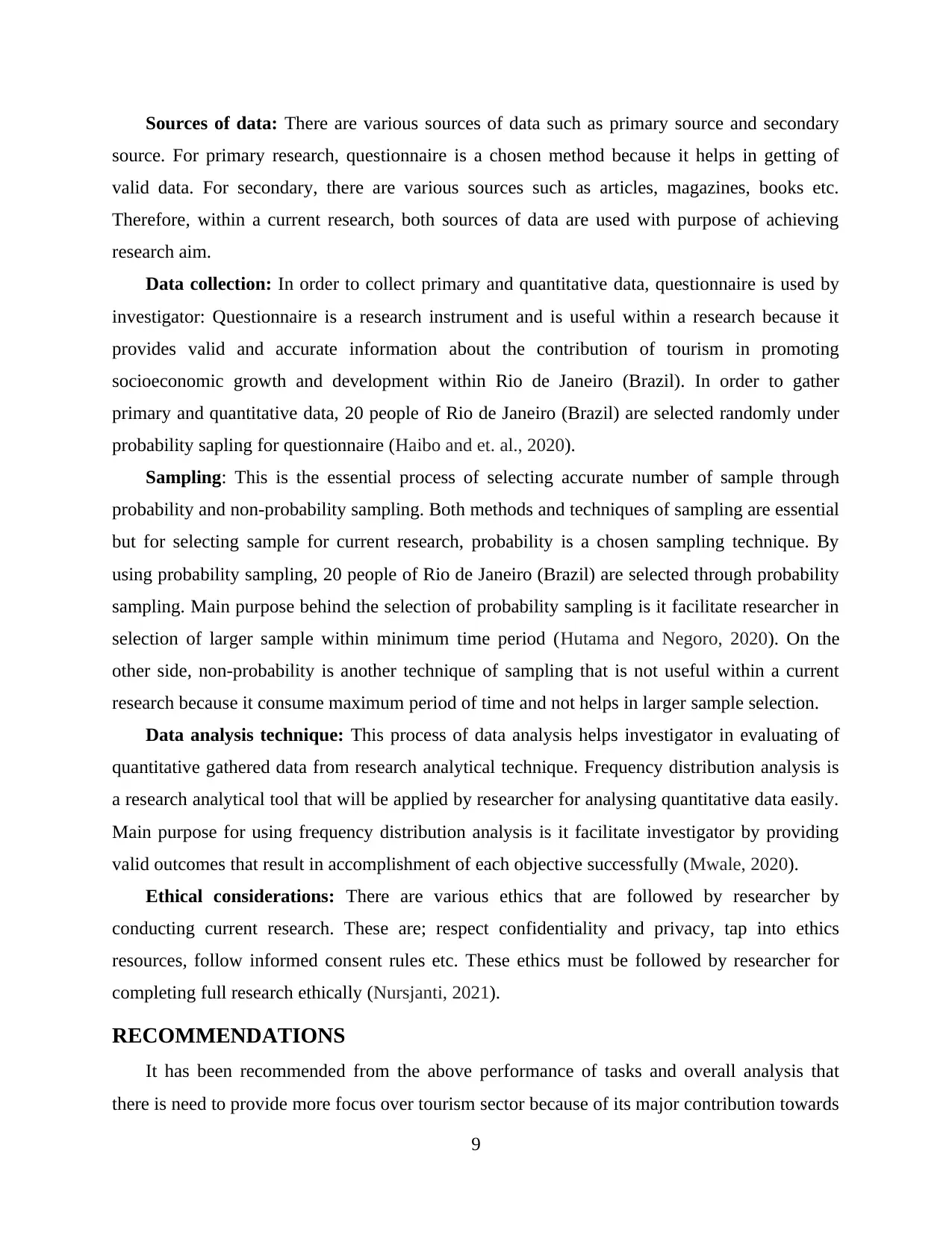
Sources of data: There are various sources of data such as primary source and secondary
source. For primary research, questionnaire is a chosen method because it helps in getting of
valid data. For secondary, there are various sources such as articles, magazines, books etc.
Therefore, within a current research, both sources of data are used with purpose of achieving
research aim.
Data collection: In order to collect primary and quantitative data, questionnaire is used by
investigator: Questionnaire is a research instrument and is useful within a research because it
provides valid and accurate information about the contribution of tourism in promoting
socioeconomic growth and development within Rio de Janeiro (Brazil). In order to gather
primary and quantitative data, 20 people of Rio de Janeiro (Brazil) are selected randomly under
probability sapling for questionnaire (Haibo and et. al., 2020).
Sampling: This is the essential process of selecting accurate number of sample through
probability and non-probability sampling. Both methods and techniques of sampling are essential
but for selecting sample for current research, probability is a chosen sampling technique. By
using probability sampling, 20 people of Rio de Janeiro (Brazil) are selected through probability
sampling. Main purpose behind the selection of probability sampling is it facilitate researcher in
selection of larger sample within minimum time period (Hutama and Negoro, 2020). On the
other side, non-probability is another technique of sampling that is not useful within a current
research because it consume maximum period of time and not helps in larger sample selection.
Data analysis technique: This process of data analysis helps investigator in evaluating of
quantitative gathered data from research analytical technique. Frequency distribution analysis is
a research analytical tool that will be applied by researcher for analysing quantitative data easily.
Main purpose for using frequency distribution analysis is it facilitate investigator by providing
valid outcomes that result in accomplishment of each objective successfully (Mwale, 2020).
Ethical considerations: There are various ethics that are followed by researcher by
conducting current research. These are; respect confidentiality and privacy, tap into ethics
resources, follow informed consent rules etc. These ethics must be followed by researcher for
completing full research ethically (Nursjanti, 2021).
RECOMMENDATIONS
It has been recommended from the above performance of tasks and overall analysis that
there is need to provide more focus over tourism sector because of its major contribution towards
9
source. For primary research, questionnaire is a chosen method because it helps in getting of
valid data. For secondary, there are various sources such as articles, magazines, books etc.
Therefore, within a current research, both sources of data are used with purpose of achieving
research aim.
Data collection: In order to collect primary and quantitative data, questionnaire is used by
investigator: Questionnaire is a research instrument and is useful within a research because it
provides valid and accurate information about the contribution of tourism in promoting
socioeconomic growth and development within Rio de Janeiro (Brazil). In order to gather
primary and quantitative data, 20 people of Rio de Janeiro (Brazil) are selected randomly under
probability sapling for questionnaire (Haibo and et. al., 2020).
Sampling: This is the essential process of selecting accurate number of sample through
probability and non-probability sampling. Both methods and techniques of sampling are essential
but for selecting sample for current research, probability is a chosen sampling technique. By
using probability sampling, 20 people of Rio de Janeiro (Brazil) are selected through probability
sampling. Main purpose behind the selection of probability sampling is it facilitate researcher in
selection of larger sample within minimum time period (Hutama and Negoro, 2020). On the
other side, non-probability is another technique of sampling that is not useful within a current
research because it consume maximum period of time and not helps in larger sample selection.
Data analysis technique: This process of data analysis helps investigator in evaluating of
quantitative gathered data from research analytical technique. Frequency distribution analysis is
a research analytical tool that will be applied by researcher for analysing quantitative data easily.
Main purpose for using frequency distribution analysis is it facilitate investigator by providing
valid outcomes that result in accomplishment of each objective successfully (Mwale, 2020).
Ethical considerations: There are various ethics that are followed by researcher by
conducting current research. These are; respect confidentiality and privacy, tap into ethics
resources, follow informed consent rules etc. These ethics must be followed by researcher for
completing full research ethically (Nursjanti, 2021).
RECOMMENDATIONS
It has been recommended from the above performance of tasks and overall analysis that
there is need to provide more focus over tourism sector because of its major contribution towards
9
⊘ This is a preview!⊘
Do you want full access?
Subscribe today to unlock all pages.

Trusted by 1+ million students worldwide
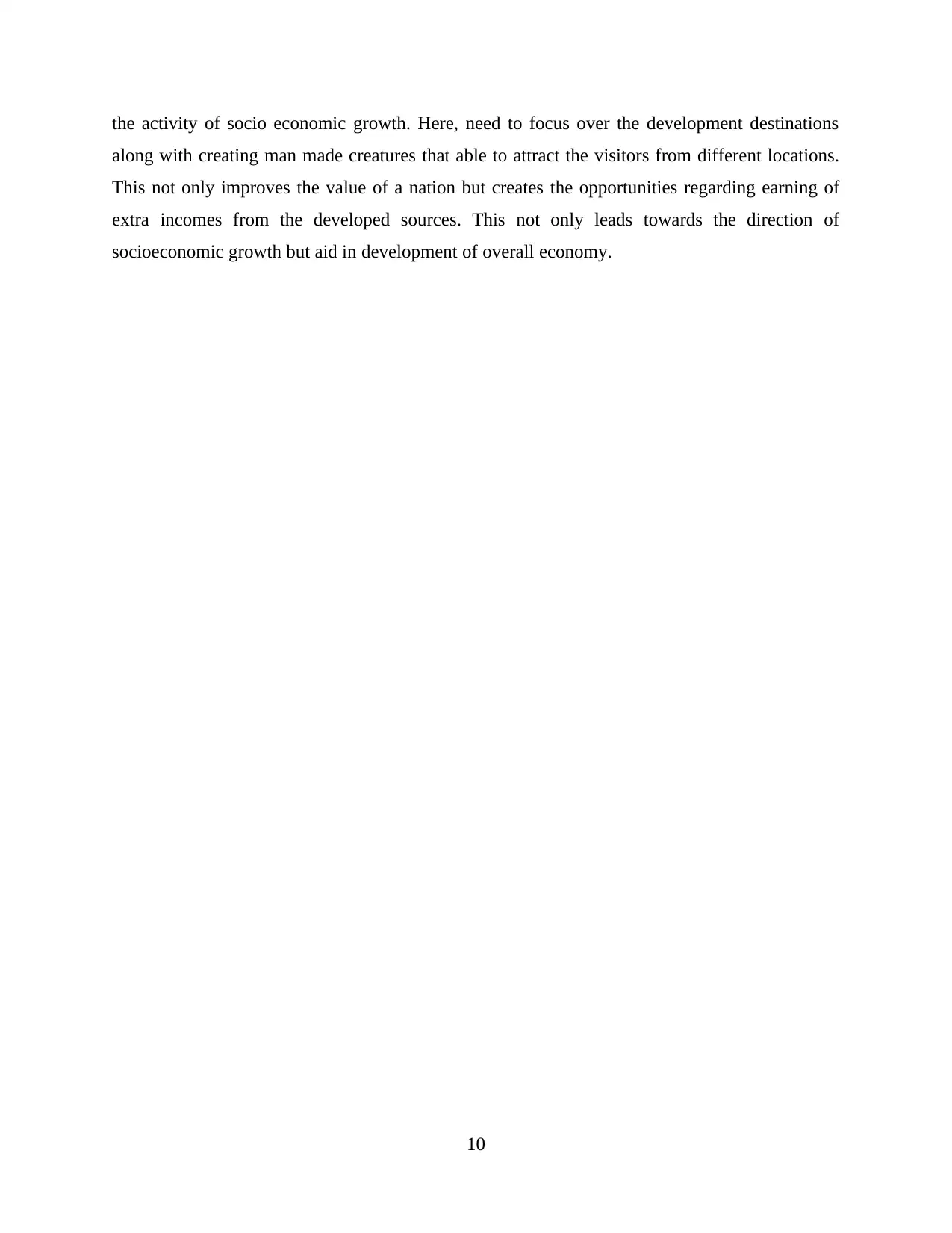
the activity of socio economic growth. Here, need to focus over the development destinations
along with creating man made creatures that able to attract the visitors from different locations.
This not only improves the value of a nation but creates the opportunities regarding earning of
extra incomes from the developed sources. This not only leads towards the direction of
socioeconomic growth but aid in development of overall economy.
10
along with creating man made creatures that able to attract the visitors from different locations.
This not only improves the value of a nation but creates the opportunities regarding earning of
extra incomes from the developed sources. This not only leads towards the direction of
socioeconomic growth but aid in development of overall economy.
10
Paraphrase This Document
Need a fresh take? Get an instant paraphrase of this document with our AI Paraphraser
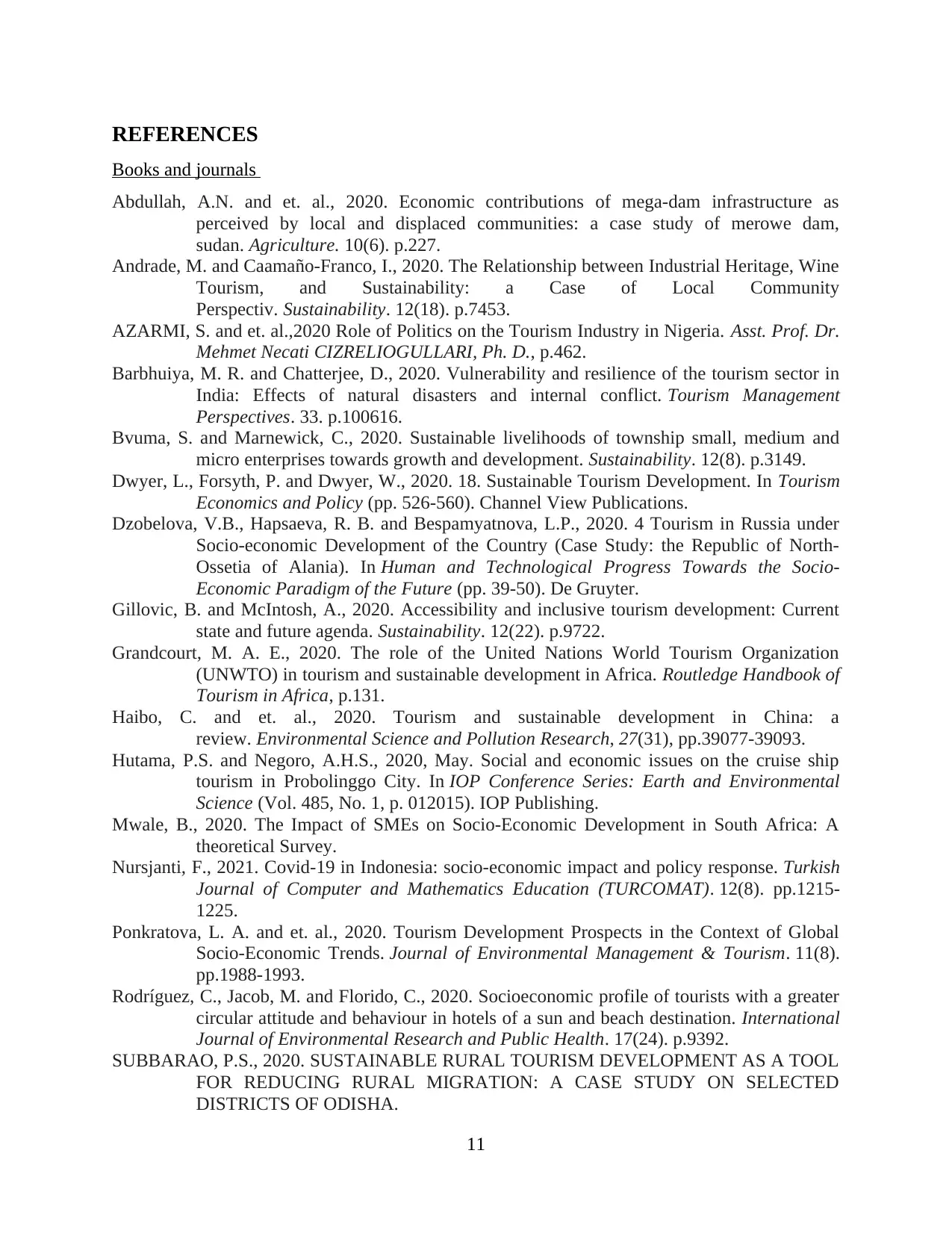
REFERENCES
Books and journals
Abdullah, A.N. and et. al., 2020. Economic contributions of mega-dam infrastructure as
perceived by local and displaced communities: a case study of merowe dam,
sudan. Agriculture. 10(6). p.227.
Andrade, M. and Caamaño-Franco, I., 2020. The Relationship between Industrial Heritage, Wine
Tourism, and Sustainability: a Case of Local Community
Perspectiv. Sustainability. 12(18). p.7453.
AZARMI, S. and et. al.,2020 Role of Politics on the Tourism Industry in Nigeria. Asst. Prof. Dr.
Mehmet Necati CIZRELIOGULLARI, Ph. D., p.462.
Barbhuiya, M. R. and Chatterjee, D., 2020. Vulnerability and resilience of the tourism sector in
India: Effects of natural disasters and internal conflict. Tourism Management
Perspectives. 33. p.100616.
Bvuma, S. and Marnewick, C., 2020. Sustainable livelihoods of township small, medium and
micro enterprises towards growth and development. Sustainability. 12(8). p.3149.
Dwyer, L., Forsyth, P. and Dwyer, W., 2020. 18. Sustainable Tourism Development. In Tourism
Economics and Policy (pp. 526-560). Channel View Publications.
Dzobelova, V.B., Hapsaeva, R. B. and Bespamyatnova, L.P., 2020. 4 Tourism in Russia under
Socio-economic Development of the Country (Case Study: the Republic of North-
Ossetia of Alania). In Human and Technological Progress Towards the Socio-
Economic Paradigm of the Future (pp. 39-50). De Gruyter.
Gillovic, B. and McIntosh, A., 2020. Accessibility and inclusive tourism development: Current
state and future agenda. Sustainability. 12(22). p.9722.
Grandcourt, M. A. E., 2020. The role of the United Nations World Tourism Organization
(UNWTO) in tourism and sustainable development in Africa. Routledge Handbook of
Tourism in Africa, p.131.
Haibo, C. and et. al., 2020. Tourism and sustainable development in China: a
review. Environmental Science and Pollution Research, 27(31), pp.39077-39093.
Hutama, P.S. and Negoro, A.H.S., 2020, May. Social and economic issues on the cruise ship
tourism in Probolinggo City. In IOP Conference Series: Earth and Environmental
Science (Vol. 485, No. 1, p. 012015). IOP Publishing.
Mwale, B., 2020. The Impact of SMEs on Socio-Economic Development in South Africa: A
theoretical Survey.
Nursjanti, F., 2021. Covid-19 in Indonesia: socio-economic impact and policy response. Turkish
Journal of Computer and Mathematics Education (TURCOMAT). 12(8). pp.1215-
1225.
Ponkratova, L. A. and et. al., 2020. Tourism Development Prospects in the Context of Global
Socio-Economic Trends. Journal of Environmental Management & Tourism. 11(8).
pp.1988-1993.
Rodríguez, C., Jacob, M. and Florido, C., 2020. Socioeconomic profile of tourists with a greater
circular attitude and behaviour in hotels of a sun and beach destination. International
Journal of Environmental Research and Public Health. 17(24). p.9392.
SUBBARAO, P.S., 2020. SUSTAINABLE RURAL TOURISM DEVELOPMENT AS A TOOL
FOR REDUCING RURAL MIGRATION: A CASE STUDY ON SELECTED
DISTRICTS OF ODISHA.
11
Books and journals
Abdullah, A.N. and et. al., 2020. Economic contributions of mega-dam infrastructure as
perceived by local and displaced communities: a case study of merowe dam,
sudan. Agriculture. 10(6). p.227.
Andrade, M. and Caamaño-Franco, I., 2020. The Relationship between Industrial Heritage, Wine
Tourism, and Sustainability: a Case of Local Community
Perspectiv. Sustainability. 12(18). p.7453.
AZARMI, S. and et. al.,2020 Role of Politics on the Tourism Industry in Nigeria. Asst. Prof. Dr.
Mehmet Necati CIZRELIOGULLARI, Ph. D., p.462.
Barbhuiya, M. R. and Chatterjee, D., 2020. Vulnerability and resilience of the tourism sector in
India: Effects of natural disasters and internal conflict. Tourism Management
Perspectives. 33. p.100616.
Bvuma, S. and Marnewick, C., 2020. Sustainable livelihoods of township small, medium and
micro enterprises towards growth and development. Sustainability. 12(8). p.3149.
Dwyer, L., Forsyth, P. and Dwyer, W., 2020. 18. Sustainable Tourism Development. In Tourism
Economics and Policy (pp. 526-560). Channel View Publications.
Dzobelova, V.B., Hapsaeva, R. B. and Bespamyatnova, L.P., 2020. 4 Tourism in Russia under
Socio-economic Development of the Country (Case Study: the Republic of North-
Ossetia of Alania). In Human and Technological Progress Towards the Socio-
Economic Paradigm of the Future (pp. 39-50). De Gruyter.
Gillovic, B. and McIntosh, A., 2020. Accessibility and inclusive tourism development: Current
state and future agenda. Sustainability. 12(22). p.9722.
Grandcourt, M. A. E., 2020. The role of the United Nations World Tourism Organization
(UNWTO) in tourism and sustainable development in Africa. Routledge Handbook of
Tourism in Africa, p.131.
Haibo, C. and et. al., 2020. Tourism and sustainable development in China: a
review. Environmental Science and Pollution Research, 27(31), pp.39077-39093.
Hutama, P.S. and Negoro, A.H.S., 2020, May. Social and economic issues on the cruise ship
tourism in Probolinggo City. In IOP Conference Series: Earth and Environmental
Science (Vol. 485, No. 1, p. 012015). IOP Publishing.
Mwale, B., 2020. The Impact of SMEs on Socio-Economic Development in South Africa: A
theoretical Survey.
Nursjanti, F., 2021. Covid-19 in Indonesia: socio-economic impact and policy response. Turkish
Journal of Computer and Mathematics Education (TURCOMAT). 12(8). pp.1215-
1225.
Ponkratova, L. A. and et. al., 2020. Tourism Development Prospects in the Context of Global
Socio-Economic Trends. Journal of Environmental Management & Tourism. 11(8).
pp.1988-1993.
Rodríguez, C., Jacob, M. and Florido, C., 2020. Socioeconomic profile of tourists with a greater
circular attitude and behaviour in hotels of a sun and beach destination. International
Journal of Environmental Research and Public Health. 17(24). p.9392.
SUBBARAO, P.S., 2020. SUSTAINABLE RURAL TOURISM DEVELOPMENT AS A TOOL
FOR REDUCING RURAL MIGRATION: A CASE STUDY ON SELECTED
DISTRICTS OF ODISHA.
11
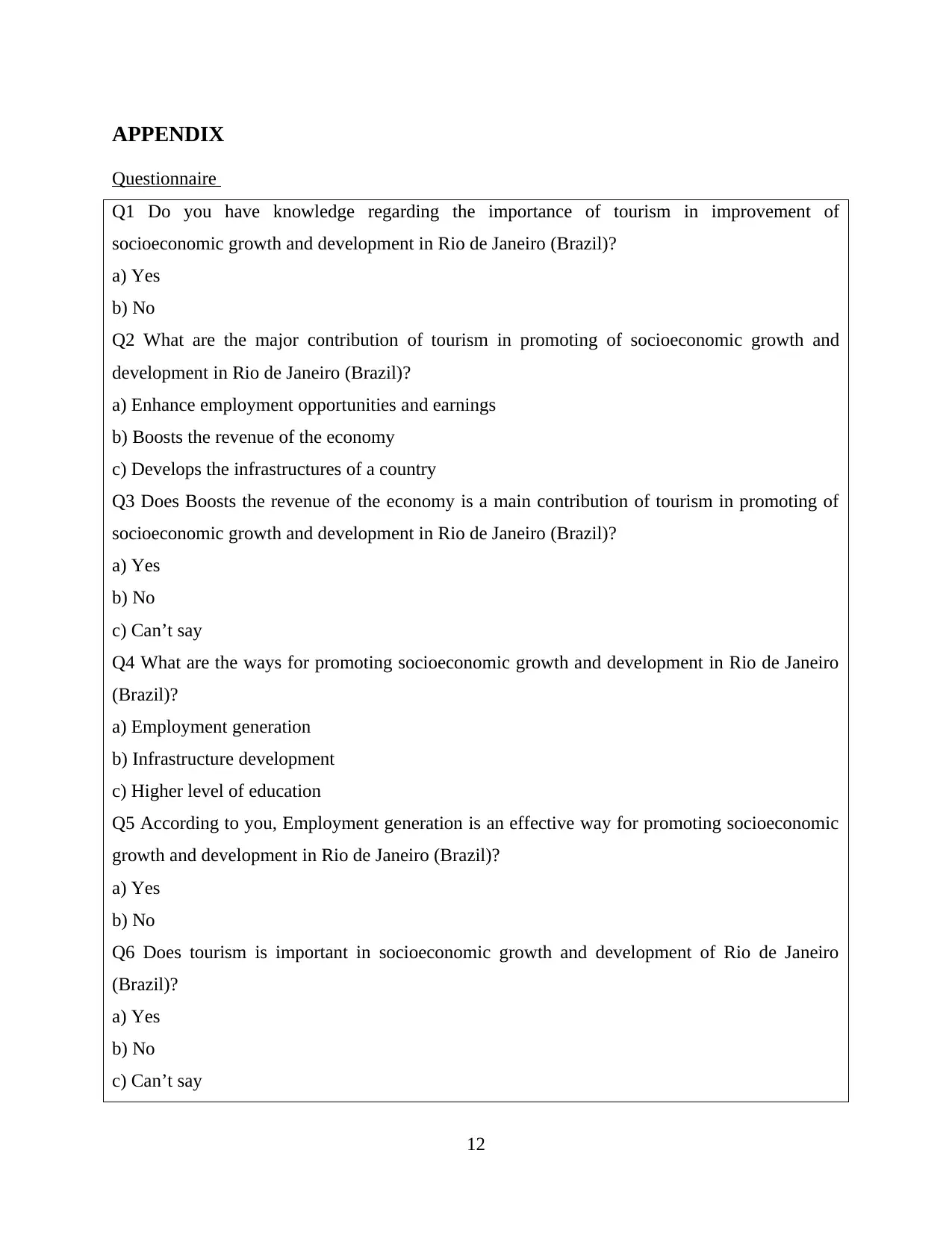
APPENDIX
Questionnaire
Q1 Do you have knowledge regarding the importance of tourism in improvement of
socioeconomic growth and development in Rio de Janeiro (Brazil)?
a) Yes
b) No
Q2 What are the major contribution of tourism in promoting of socioeconomic growth and
development in Rio de Janeiro (Brazil)?
a) Enhance employment opportunities and earnings
b) Boosts the revenue of the economy
c) Develops the infrastructures of a country
Q3 Does Boosts the revenue of the economy is a main contribution of tourism in promoting of
socioeconomic growth and development in Rio de Janeiro (Brazil)?
a) Yes
b) No
c) Can’t say
Q4 What are the ways for promoting socioeconomic growth and development in Rio de Janeiro
(Brazil)?
a) Employment generation
b) Infrastructure development
c) Higher level of education
Q5 According to you, Employment generation is an effective way for promoting socioeconomic
growth and development in Rio de Janeiro (Brazil)?
a) Yes
b) No
Q6 Does tourism is important in socioeconomic growth and development of Rio de Janeiro
(Brazil)?
a) Yes
b) No
c) Can’t say
12
Questionnaire
Q1 Do you have knowledge regarding the importance of tourism in improvement of
socioeconomic growth and development in Rio de Janeiro (Brazil)?
a) Yes
b) No
Q2 What are the major contribution of tourism in promoting of socioeconomic growth and
development in Rio de Janeiro (Brazil)?
a) Enhance employment opportunities and earnings
b) Boosts the revenue of the economy
c) Develops the infrastructures of a country
Q3 Does Boosts the revenue of the economy is a main contribution of tourism in promoting of
socioeconomic growth and development in Rio de Janeiro (Brazil)?
a) Yes
b) No
c) Can’t say
Q4 What are the ways for promoting socioeconomic growth and development in Rio de Janeiro
(Brazil)?
a) Employment generation
b) Infrastructure development
c) Higher level of education
Q5 According to you, Employment generation is an effective way for promoting socioeconomic
growth and development in Rio de Janeiro (Brazil)?
a) Yes
b) No
Q6 Does tourism is important in socioeconomic growth and development of Rio de Janeiro
(Brazil)?
a) Yes
b) No
c) Can’t say
12
⊘ This is a preview!⊘
Do you want full access?
Subscribe today to unlock all pages.

Trusted by 1+ million students worldwide
1 out of 13
Related Documents
Your All-in-One AI-Powered Toolkit for Academic Success.
+13062052269
info@desklib.com
Available 24*7 on WhatsApp / Email
![[object Object]](/_next/static/media/star-bottom.7253800d.svg)
Unlock your academic potential
Copyright © 2020–2025 A2Z Services. All Rights Reserved. Developed and managed by ZUCOL.





